Welcome to Comics Are My Religion, a look at theology through the lens of comic books. There are some basic ground rules about engaging in respectful dialog about religion in this column. The column below may have spoilers, so be warned!
Welcome back to Comics Are My Religion! I have been on a bit of hiatus for a few months due to a tremendous amount of work I have been doing. Strange for a pastor who only works one day a week, right? I did not expect to write this column, but when I recently went to see Warner Brothers’ new Zack Snyder/Christopher Nolan Man of Steel, I knew I had to comment.
I do not recall a superhero movie being quite as divisive as this one. It’s pretty universal that folks are loving the latest superhero movies like The Avengers or Nolan’s Dark Knight films. Other films, like Ghost Rider, Green Lantern, and Jonah Hex have been universally panned. However, Man of Steel has firmly divided both the comics community and the action film community. There are numerous articles on why this movie is great or why it sucks, and go into all the reasons why. For my purposes here, I’m going to focus on one aspect of the film.
Let me be clear: while I love and respect the idea of Superman, I am not what one would call a huge fan of the character. I love the symbol that Superman embodies. To me, more than any other character, Superman symbolizes the entirety of heroes, goodness, justice, and all of the elements that make comic books, television, and movies worth watching. So to tackle Superman in a film is nearly impossible. I went into this movie not watching the trailers (except one of the first teasers), and tried to view it without any concept of what has come before. I don’t particularly think that any of the previous incarnations have nailed the ideal of what Superman can be. I was hoping that with Christopher Nolan’s role in producing that this would be a stripped-down, core-element type of representation, much like he did with Batman.
Instead, I walked away with a very muddled definition of who Superman is and who he is supposed to be in the 21st Century.
Superman, in my opinion, is most clearly realized in his Messiah-like traits. Many have agreed that Joe Shuster and Jerry Siegel, both Jewish, created Superman with the Messiah archetype in mind. Granted, Christians have thus overlaid their theology that Superman was meant to be Jesus, however, this is a poor interpretation. Superman is primarily a Jewish concept and should remain as such. To tie Superman to represent Jesus of Nazareth, while they may have similarities, is not analogous. Instead, one must realize that both Superman and Jesus play out a Jewish Messianic archetype, rather than Superman playing out a Jesus archetype.
So by himself, Superman is messianic in nature. There needs not be any Jesus-references in any portrayal of the character. Superman is the metaphor, and to convolute that metaphor by overtly tying him to Jesus is a disservice to both.
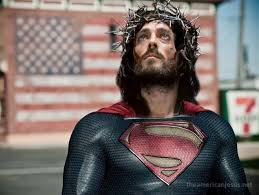
Yet this movie seems to be making a clear (and clunky) statement that Superman is Jesus. Perhaps the most overt scene is when Clark Kent goes to a church and speaks to a priest about his choice to give himself over to the government so they can give him over to Zod. The scene shows a close up of Henry Cavill as Clark Kent, with a stained glass image of Jesus (the classic portrayal of him praying in the Garden of Gethsemane) directly over his shoulder. Another moment is when Superman rips apart the Kryptonian space craft and falls back to Earth. Someone says, “He has saved us,” and as he falls, he is in cruciform pose. I remember something similar in Bryan Singer’s Superman Returns. Heavy-handed is putting this nicely.
You would think, as a priest, I would enjoy Superman being used to communicate the Gospel of Jesus Christ. Yet I think the filmmakers make this so dumbed-down for all audiences that it’s insulting to both Christians, Jews, and people of no faith. Superman can stand on his own. There’s no need for overstating the metaphor.
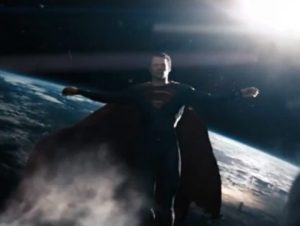 But perhaps the largest oversight in the movie is that while they take the time to beat us over the head with the Jesus connection, in the end, Superman acts nothing like a Messiah.
But perhaps the largest oversight in the movie is that while they take the time to beat us over the head with the Jesus connection, in the end, Superman acts nothing like a Messiah.
He and Zod fight all over Metropolis, with buildings falling every time a punch is thrown. In a post-9/11 society, we now know what damage is inflicted by a building falling. To have 20 or 30 fall in one movie, caused by a Christ-figure who can’t just fly his enemy into space, just doesn’t make sense and was frankly offensive. Interviews with Zack Snyder have stated that this is to set up the next movie, but I believe movies should stand on their own with no promise of follow-up. There should have been a scene where Clark mourns the loss of life as a result of his fight. Instead, we get a cutesy scene of him getting a job at the Daily Planet.
Finally, and perhaps the most controversial bit of the film, is that Superman kills Zod. This choice undercut every other heavy-handed Messiah message Snyder and Nolan were trying to make. Some will argue that Superman has killed in the comics. I’m not saying that Superman can’t kill, but the way the filmmakers built him to be a Savior, then reneged, sullied the experience. In Man of Steel, Superman ends up not being a Messiah-figure at all, but just another action hero.
So this movie didn’t nail it. That’s OK. There will be other portrayals which will also have their problems. For now, I’ll say to the filmmakers that they should stick to action and let go of the religious allusions. Religious metaphors need not be so overt, nor refuted in the same film.
Jeff Jackson
jeff@comicattack.net
@FrJeffJackson

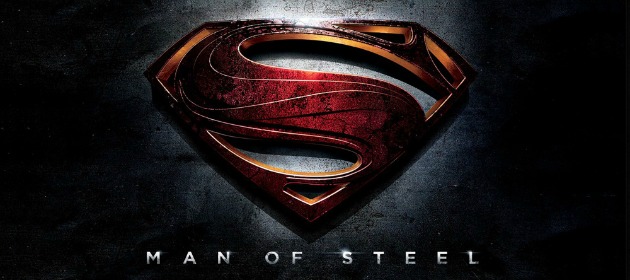

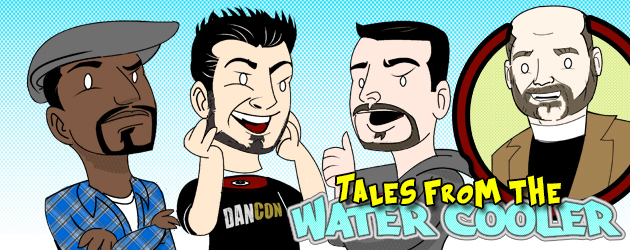
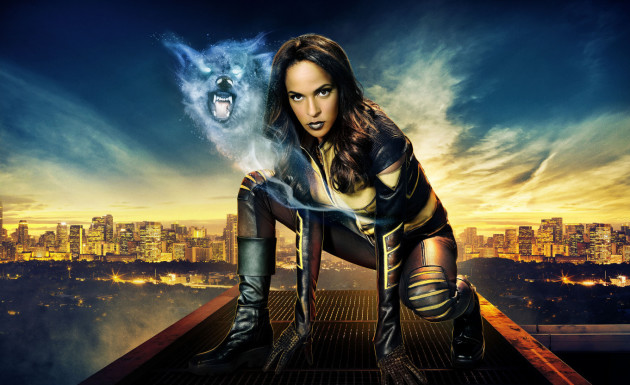
Excellent read as usual, Jeff.
Hey Jeff. I remember your comment on my Man of Steel review, so as I said I would, I came to check out your article and offer up my feedback.
Let me start by saying:
“To me, more than any other character, Superman symbolizes the entirety of heroes, goodness, justice, and all of the elements that make comic books, television, and movies worth watching”
This is too true.
I said something similar in my review before MoS, for “Superman: The Movie”, only not quite as eloquently as you did.
Referring to Superman as the first of the “superheroes” I said “it is this first that all other heroes have been measured against ever since”.
So, to better keep track of the discussion, the back and forth, I usually quote whatever statement of yours I would be addressing. Hope that’s alright.
Your comment:
“Many have agreed that Joe Shuster and Jerry Siegel, both Jewish, created Superman with the Messiah archetype in mind.”
I wouldn’t say that it’s the Messiah archetype insofar as Siegel and Shuster are concerned.
Considering that: Messiah in Hebrew literally means “the Anointed King” though specifically “the anointed”, often referring to Jewish Kings or Priests. In Jewish eschatology, the term came to refer to a future Jewish king from the Davidic line, who will be “anointed” with holy anointing oil, to be king of God’s kingdom, and rule the Jewish people during the Messianic Age. In Judaism, the Messiah is not considered to be God or a divine Son of God.
In regard to the “Jewish” aspect of Superman’s creation, he is more closely linked to Moses specifically, rather than any possible future “king of God’s kingdom”.
Moses was a messianic-like figure, but even though he lead his people out of Egypt he failed, and was punished and not allowed to see them reach the Promised Land, dying before they got there. So, it is in this regard that I find Superman rings truest. A “flawed, messiah-like figure”, not as any allegory for an actual Messiah-figure.
A small distinction, but an important one nonetheless I think.
But as Moses was put in a basket to be sent away from danger, Superman was put into a rocket to avoid the destruction of Krypton.
It wasn’t until the Richard Donner/Christopher Reeve Superman that the switch to Jesus occurred and rather explicitly at that.
Jor-El, a disembodied figure (God/Holy Spirit) sends himself, or a new version of himself to Earth…
“The son becomes the Father, and the Father… the son”.
To save humanity from itself (thieves, violent criminals, Lex Luthor, etc):
“They can be a great people Kal-El, they wish to be. They only lack the light to show the way. For this reason above all, their capacity for good, I have sent them you… my only Son.”
Though, while on the subject of Christianity VS Judaism, I’d like to share my favorite funny moment from SUPERMAN II.
Two old ladies just witness Superman saving a boy at Niagara Falls.
Old Lady 1: “What a nice man!”
Old Lady 2: “Of course, he’s Jewish!”
Your statement:
“Another moment is when Superman rips apart the Kryptonian space craft and falls back to Earth. Someone says, “He has saved us,” and as he falls, he is in cruciform pose. ”
Not quite. You’re remembering two different scenes and not entirely correctly.
After he crashes the Scout Ship that Zod is piloting and sends the Kryptonians into The Phantom Zone, Jenny comes out of the rubble and says: “Are they gone? … He saved us.”
The crucifix pose happens over half an hour earlier right after Lois escapes from Zod’s command ship with the help of Jor-El’s hologram.
But yes. I too agree that the “Jesus behind Clark” scene and the Crucifix-pose moment were heavy-handed and pointless. Just like Bryan Singer’s scenes in Superman Returns.
Though, THAT film was even worse/more blatant. Having Superman “die” saving us, and fall in the Crucifix-pose, flat-lining at the hospital only to resurrect later.
But this symbolism appeared in the comics first. Recall if you will the “Death and Return of Superman” storyline from the comics or it’s movie adaptation “Superman: Doomsday”. The whole death/sacrifice himself for us/resurrection scene is right out of that story.
I also think the Stained Glass Jesus and the space crucifix shot are the only blatant times that the “Superman is Jesus” moment occur.
Also, I’d like to take this moment to make a side-statement.
The worst (in my opinion) of these superhero/Jesus moments comes from Spider-Man 2 of all places.
It’s right after Spider-Man fights Doc Ock and saves the train full of people. He’s in the crucifix pose on the front of the train, trying to stop it. Then again as he’s carried down by the people he saved. The carrying him down (off of the cross) part is the worst for me, as it’s done with heavy-handed music and all very slowly, as Spidey has just “sacrificed” himself to save them, only to get up a few seconds later, totally fine.
Your Comment:
“Yet I think the filmmakers make this so dumbed-down for all audiences that it’s insulting to both Christians, Jews, and people of no faith. Superman can stand on his own. There’s no need for overstating the metaphor.”
YES! I wholeheartedly agree!
“But perhaps the largest oversight in the movie is that while they take the time to beat us over the head with the Jesus connection, in the end, Superman acts nothing like a Messiah.”
But I think this is the problem with your interpretation.
1) The movie doesn’t beat us over the head with it.
2) Superman isn’t presented as a Messiah. He’s presented as a flawed, conflicted, confused Messiah-LIKE figure.
He’s Moses. And he fails just as Moses did.
“In a post-9/11 society, we now know what damage is inflicted by a building falling. To have 20 or 30 fall in one movie, caused by a Christ-figure who can’t just fly his enemy into space, just doesn’t make sense and was frankly offensive.”
I didn’t find it offensive. It also wasn’t 20 or 30. There were a bunch of buildings that fell during the World Engine attack. But it was CLEARY going slowly, something that almost nobody critiquing the film notices, as people were shown being able to outrun it for a brief time. Perry and crew only got a few blocks away from Ground Zero before getting stuck with Jenny (who was trapped). And Zod and Superman only took out maybe half a dozen buildings. And taking the fight into space only made things worse, as Zod brought it back to Earth.
The same level of destruction was wrought in Marvel’s The Avengers. The only difference is, MoS didn’t pull the cameras away to someone making a snarky one-liner. They kept the “camera on the action” to quote Lois (in Superman: Doomsday). And respect that.
I think this movie would have been better served if they had one long-distance shot, showing that only a fraction of the sprawling city was destroyed, and showed more than a dozen people standing around alive. I personally think that half the reason they only showed a few people in the end is that a lot of them had already escaped by the time the fireworks really got going.
Addressing these statements in tandem:
“Finally, and perhaps the most controversial bit of the film, is that Superman kills Zod.”
“Some will argue that Superman has killed in the comics. I’m not saying that Superman can’t kill, but the way the filmmakers built him to be a Savior, then reneged, sullied the experience.”
Yes. Superman has killed. A LOT. And has killed Zod more than once. In both comics, and previous adaptations dating back all the way to the early 1940s.
But I would like to point out, that being a savior does not mean not being able to kill. The two notions are not mutually exclusive.
By KILLING Zod, he saved billions of lives. He didn’t WANT to kill Zod. In fact, half the destruction of their fight was caused by Superman’s reluctance to kill Zod.
And savior’s kill. All the time.
1) Look at King Arthur. Britain’s Messiah with a Sword. A knight, that killed his own son.
2) Let’s go back to Moses. The story of the Jews flight from Egypt. GOD killed people left and right during that story. In fact, in a LOT of the stories of the Bible, God kills a lot of people. People in the service of God, in the Bible, kill a lot of people. Samson specifically asks God for the strength to kill his persecutors, for one example. I could sit here all day listing examples of people killing to save others, in The Bible, in Comics, in movies, in Comic book movies, in real life.
I hope that wasn’t TOO long-winded, too annoying, or too offensive.
I also hope to hear back from you.
I didn’t read all of that, but what I did was awesome.
What a wonderful, thoughtful, insightful, and well-written response, Aaron! Thank you so much for submitting it. I want to be sure to respond to what you’ve pointed out.
1. Thank you for the clarification on the Jewish understanding of Messiah. Of course, you are exactly right. I had forgotten that the term “Messiah” has been co-opted by Christians so the Jewish meaning and Christian meaning are very different. By the Jewish understanding, you’re right in saying that the idea of Messiah is less divine and therefore there is room for flaws. By this understanding, MoS could possibly be a better movie if I go back and watch it. However, with the Jesus-references, I don’t think I can give the filmmakers credit in realizing a Jewish understanding of Messiah in the portrayal of Superman. I think they were intentionally skewing the Judeo-Christian archetype for the sake of shock value. Hollywood does this all the time, and many times better than this. I think if they had removed the Jesus stuff, it would have been stronger and Cavill’s Kal-El would have been more sympathetic.
Thank you also for the reminder about the Moses connection. He definitely serves the archetype, as does David, and both were flawed characters. (As a side note, I would say that there are arguably times when Jesus has some flawed characteristics, so even the Christian idea of Messiah doesn’t equal “perfection” for me.)
2. As for the correction about the cruciform pose and the “He saved us” line, I’m sure I flubbed that one as I saw it at the midnight showing. However, I do clearly remember a line just before he fell back to the earth in the cruciform pose because I made an audible groan in the theater and my buddy laughed. Do you remember the line?
I, too, groaned at that scene in Spider-Man 2. Why are these filmmakers trying to Bible-beat us (said the Episcopal priest)?
3. I think we’ll have to disagree about whether or not it was heavy-handed. I certainly think it was. I felt like there were arrows pointing at Henry Cavill throughout the movie that said “Hey, look, he’s Jesus!” Of course there weren’t really, but it felt more overt than the previous Superman movies.
4. Some self-disclosure: perhaps I’m sensitive to the buildings falling as I was in DC when the plane hit the Pentagon. I remember the chaos. Granted, I wasn’t in NY and wasn’t present for the Towers falling, but there’s still a connection for me, so when I see disaster movies, I tend to count the buildings that fall or are damaged significantly. I lost count in this movie after about 15 or 16 (and that was just in the Smallville scene). By the time I made it to Metropolis, I almost walked out.
I think if there had been a scene where he was struggling with whether or not he should stay on Earth having just produced so much destruction and death, I would have felt better and it would have led into a future movie. Or they could have had a quick shot of the General saying, “Metropolis has been completely evacuated.” However, the cutesy Daily Planet ending made me want to barf in light of everything. If, as people are suggesting, that Lex Luthor is introduced as the one who cleans up Superman’s mess, I will count myself in his corner. I think Snyder and Nolan have some serious cataclysm fetishes.
I think Snyder and Nolan have some serious cataclysm fetishes.
5. Yes, I agree, the Bible is full of murder. But that doesn’t make it right. I’m no violence teetotaler, but I think some characters, Superman especially, aspire to something greater. I don’t like that he’s killed in the comics, either, but I know that some creators are going to write themselves into that corner and will take the easy way out rather than dream up a better idea. But now that Superman has killed in the movies, I think all bets are off on the character. I wanted to title this column, “God isn’t dead, but Superman appears to be,” but decided against it. This seems like a good place to put it.
Again, I’m grateful for your thoughtful response.
1. The skewing of Judeo-Christisn archetypes is definitely something Hollywood is guilty of. This is true.
2. Its just after Lois escapes in the pod. Faora damages her pod with her blaster gun. Jor-El says “strike that panel.” Superman breaks the wall. Jor-El instructs him to look out of the ship. Superman exclaims “Lois!”. Jor-El says “You can save her Kal. You can save all of them.”
Referring to humanity, I suppose not so much Krytonians since they’re fighting. And considering Kal saves several billion by the end I suppose he does.
3. I guess I felt it was less overt than Superman: The Movie and Superman Returns.
4. I agree that they should have taken a moment to show Superman trying to move the fight away from metropolis. And had the general say something about civilians being safe. Superman moved the fight to the arctic in Superman II. And yes! They most certainly love their cataclysms. I agree with you there.
5. So are you saying that you’ll never watch another Superman film? I’m not sure I follow your meaning by “
Yes! That was the line I groaned at. Thanks for the correction! I thought that was so lame.
I will be wary about seeing another Superman movie. I will probably wait until DVD instead of spending $10 on a ticket.
Sorry. Mobile Internet messed me up.
I’m not sure I follow your meaning by ~
“But now that Superman has killed in the movies, all bets are off”.
He’s killed in movies before this one. In the early 1940s animated theatrical serials. In the 1948 black & white feature starring Kirk Alyn. In Superman II he deliberately kills Zod. In Superman III he inadvertently kills the villain. He also splits in two and eventually strangles his evil half. In Superman IV he kills Nuclear Man, a creature clones from superman’s and Luthor’s DNA.
So this film isn’t the first to have him kill.
I hate to say, but for the majority of today’s viewers, no one remembers that Superman killed in those other incarnations. I certainly didn’t because it’s never been at his core. Today, superheroes are more in the limelight than ever before. To have Superman on such a pedestal and to resort to something that’s against a core value of what he stands for may be off-putting for the casual viewer. Or maybe not. Maybe the world is ready for the grim, destructive, anti-Messiah of the Man of Steel, and I’m just an old fuddy-duddy. If that’s the case, then I will certainly concede and let others have him. I’ll spend my money elsewhere.
Thank you for your well thought out and informative reply, by the way. Would have thanked you sooner. But I’m replying on a mobile device. Anything over a paragraph gets darn near impossible.
You rock, dude. Thanks for having a well-reasoned conversation with me. And for politely correcting me on my flubs.
Thanks. You rock too.
I guess I never found it to be a core of his character. Because I grew up with all of those versions where he did kill. I’ve always looked at it like this: superman, like batman, is a man if conviction. I find them killing less of an issue than say hypocrisy. For instance, batman has killed in the comics before. Has tried yo kill the joker. So I didn’t mind when say he killed joker in the 1989 movie. But in nolan’s movies, when he goes on and on about not killing and then kills Ra’s, Two-Face, and actively helps cause Talia’s death and condones Banes death – I find that level of hypocrisy more disturbing.
Superman has been shown to kill. But only in dire situations and only those stronger or equal in strength. Its like in “the death and return of superman” story. No one bated an eye when he killed doomsday. But people knew something was up when The Last Son of Krypton (the eradicator in the guise of superman) killed some muggers.
I hope that explanation of my view makes more sense.
Pingback: Stay Tooned Sundays: CW’s ‘Superman & Lois’ Premiere – ComicAttack.net